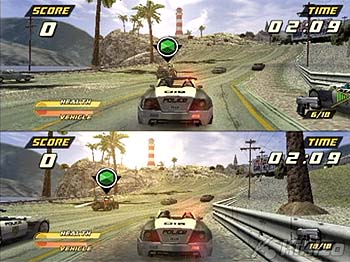Pursuit Force: Extreme Justice: Interview
How movies and forum posters helped make the Pursuit Force sequel a better game.
Page 2
But these changes have to mean something. Bigbig is looking to make better games but it's not putting new stuff into Extreme Justice to make it a different game.
"What we've done," explains Whiteside, "is, like with any sequel to anything, we've found out what the areas of the game are that we can improve and then we smoothed everything off and put in the things that we think are missing for the ultimate action adventure where you're the hero."
Key to making that happen is keeping focused, making players feel like they're in control when it matters. Whiteside explains his frustration at those moments in games when movie sequences take over at crucial points rather than letting players handle it themselves. "There used to be a time when I thought that was a nice reward, but I can go and watch a movie or something like that."
So players have more control over the run of things in Extreme Justice, something the team freely acknowledges is a risk. But there are ways to mitigate that uncertainty.
First, the story. Bigbig turned to Hollywood scriptwriters to create the core of the game, which sees new gangs, the strike-fast-strike-hard Raiders and the bank-robbing Syndiate, enter the city. That story was then passed along to the design team, who added their touches, and then together everyone argued over where players would do what. The end result: a "bible" for game direction.
"Every major storytelling element that we think is important is played out in the game," Whiteside says. "When the player plays it he doesn't feel like he's being told a story. He should feel like he's creating the story as he goes through."
Additional storytelling and characterization is handled in other ways, such as in bracketing movie sequences that recount what you've just done in the current act and set the scene for the next one. "In no way are they driving the storyline at all. It's just a recap, like at the start of 24."
The mention of the hit TV action series isn't incidental. The show serves as a source of inspiration in other areas too, both aesthetic and beyond. Whiteside points to the causal relationships in 24, which he says mirror in some ways what the team is doing with Extreme Justice.
"Every action has some kind of reaction, and you're not going to know what the reaction is. Hopefully, you're not going to be able to get it. Having said that, people are quite clever about these kind of things and they do get it."
As a project for both PlayStation 2 and PSP, concessions have naturally crept into the design document. Mobile players sometimes (but not always) demand short bursts, while the drawn-out experiences are more suited to home play. Pursuit Force will toe the line and has deliberately aimed for a balance that won't alienate either set.
Missions can stretch longer than some mobile players may prefer, but there are also other modes for them, such as the bounty mode, which strips out the story and lets you play individual chapters, rewarding you with tokens to purchase items at the in-game store. There are also around 60 minigames each lasting only around 3 minutes.








 Satoru Iwata Video Interview - the late Nintendo president spoke with Kikizo in 2004 as 'Nintendo Revolution' loomed.
Satoru Iwata Video Interview - the late Nintendo president spoke with Kikizo in 2004 as 'Nintendo Revolution' loomed. Kaz Hirai Video Interview - the first of Kikizo's interviews with the man who went on to become global head of Sony.
Kaz Hirai Video Interview - the first of Kikizo's interviews with the man who went on to become global head of Sony. Ed Fries Video Interview - one of Xbox's founders discusses an epic journey from Excel to Xbox.
Ed Fries Video Interview - one of Xbox's founders discusses an epic journey from Excel to Xbox. Yu Suzuki, the Kikizo Interview - we spend time with one of gaming's most revered creators.
Yu Suzuki, the Kikizo Interview - we spend time with one of gaming's most revered creators. Tetris - The Making of an Icon: Alexey Pajitnov and Henk Rogers reveal the fascinating story behind Tetris
Tetris - The Making of an Icon: Alexey Pajitnov and Henk Rogers reveal the fascinating story behind Tetris Rare founders, Chris and Tim Stamper - their only interview? Genuinely 'rare' sit down with founders of the legendary studio.
Rare founders, Chris and Tim Stamper - their only interview? Genuinely 'rare' sit down with founders of the legendary studio. The History of First-Person Shooters - a retrospective, from Maze War to Modern Warfare
The History of First-Person Shooters - a retrospective, from Maze War to Modern Warfare